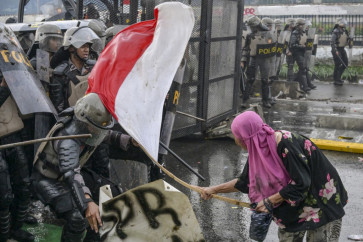Popular Reads
Top Results
Can't find what you're looking for?
View all search resultsPopular Reads
Top Results
Can't find what you're looking for?
View all search resultsRemoving the trade obstacles
As the World Trade Organization (WTO) nations approach the July 31 deadline to ratify the Bali Trade Facilitation Agreement, dozens of trucks queue to cross the border from Kenya to Uganda
Change text size
Gift Premium Articles
to Anyone
A
s the World Trade Organization (WTO) nations approach the July 31 deadline to ratify the Bali Trade Facilitation Agreement, dozens of trucks queue to cross the border from Kenya to Uganda.
Hauling tomatoes along East Africa's northern border, these truckers have lost up to four hours in reduced speed because of poor road conditions along some segments. But when they approach the border, the delays get longer. It takes on average a full day for them to complete the paperwork required to cross from Kenya into Uganda.
The delay would cause financial losses with any freight, but it is especially troublesome with agricultural goods, where delays could leave much of a truckload unfit for sale at its destination.
This same losing scenario plays out in Mexico, too. Guatemalan exporters sending goods overland to Mexico are forced to offload their cargo from Guatemalan trucks at the border and reload it onto Mexican trucks, a regulatory hurdle that both contributes to food spoilage and discourages commerce.
In a world where 12.5 percent of the population suffers chronic undernourishment, the fact that 30 percent of food produced for human consumption is lost or wasted between farm and fork is difficult to comprehend. Along the agricultural supply chain ' from post-harvest storage through transportation and distribution ' spoilage, spillage and other contributors to food loss remain a serious problem.
Globally, up to 1.3 billion tons of food is lost or wasted each year, evidence that hunger is a dramatic consequence of unnecessary trade barriers. Even cutting that figure in half would make a significant contribution to improving world hunger.
The Trade Facilitation Agreement, which was drawn up last December at the WTO's Ministerial Conference in Bali, sets the stage for faster and more efficient customs procedures that could encourage dramatic improvements, not only in world hunger but also in environmental sustainability and economic development.
Research conducted for the World Economic Forum by the World Bank (WB) and the management consulting firm Bain & Company found that reducing even a restricted set of supply chain barriers halfway to global best practice would yield a nearly 5 percent increase in gross domestic product (GDP), or six times the benefit of removing all remaining tariffs. The benefits to emerging nations, in particular in Africa and Southeast Asia, would be proportionally much higher.
This agreement is a giant leap in the right direction. It supports effective cooperation between customs and other authorities on trade facilitation and customs compliance issues. It also provides for technical assistance that will help countries build electronic capabilities to speed the flow of goods.
But while the agreement opens the door for improving inefficient ' and, at times, corrupt ' border administration, it will be up to governments and private enterprises to implement it and to systematically identify and eliminate the other supply chain barriers that keep people hungry and inhibit trade.
Those hurdles include protectionist measures that limit market access, underdeveloped transportation infrastructure and services, and regulatory environments that preclude small-to-medium sized businesses.
The public sector is best positioned to reduce these barriers, usually in partnership with private enterprises, and with both organizations benefiting from each the others' strengths. Hopeful nations can point to the encouraging advances made by pioneering efforts. When Kenya's government improved the Nairobi-Mombasa road and expanded the Mombasa port's capacity and power, it led to much-needed private sector investment by exporters and transporters.
Investments in refrigerated containers and covered trucks, along with support for smallholder farms to acquire export certification, helped reduce food loss and enabled Kenya to reach the tipping point at which it became profitable for the country's enterprises to serve new European markets for its avocados.
Also, by removing fertilizer price controls and subsidies, Kenya spurred competition that lowered fertilizer end prices, triggering a 14 percent increase in adoption rates among small farmers.
Now, Kenya has plans to implement a fully automated customs system, allowing maritime, air and road shippers to submit all their official documents through one electronic portal. The benefits are many. It will enable shippers to operate more efficiently and save money. It will improve compliance, boosting the government's revenues from import duties and other taxes.
And the transparency created by the electronic system will reduce the corruption that has plagued international trade in the past. Kenya's government expects the system to help raise the country's ranking on the annual Doing Business report issued by the International Finance Corporation and the WB, and to help attract foreign direct investment.
When the WTO members ratify the Trade Facilitation Agreement, they can intensify efforts to apply what they've learned from pioneering countries on their own soil. By eliminating supply chain barriers, they'll set in motion a virtuous cycle, raising global productivity and tackling the enormous ' and enormously rewarding ' challenge of feeding the undernourished.
______________
Mark Gottfredson is a Bain & Company partner based in Dallas. Gerry Mattios is a Bain & Company principal based in Beijing.










